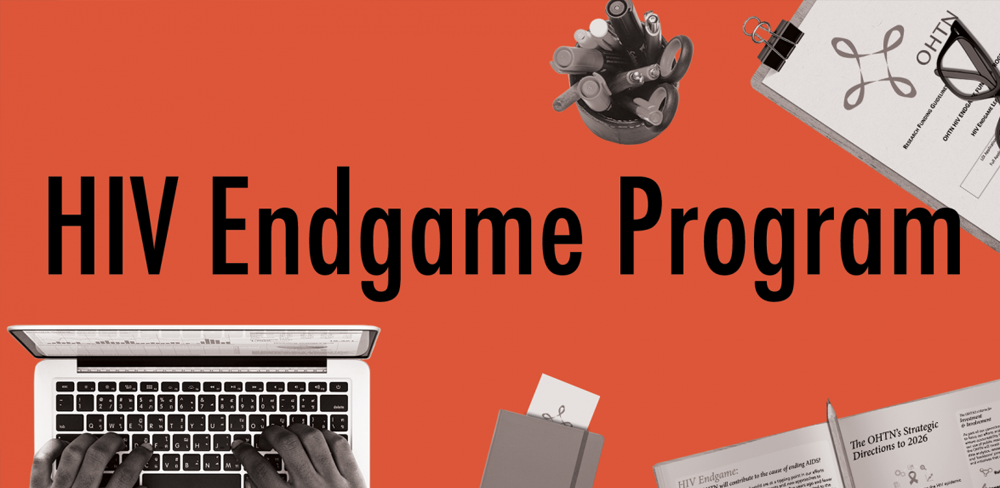The OHTN is pleased to announce the results of its 2022-2023 HIV Endgame Funding Program competition!
- The most recent results can be viewed here.
- The results of the Fall 2021-2022 competition can be viewed here.
- The results of the Spring 2020-2021 competition can be viewed here.
- The results of the 2019-2020 competition can be viewed here.
- The results of the 2018-2019 competition can be viewed here.
This funding program supports people and projects that have the potential to:
- meet the needs of populations in Ontario most affected by HIV
- drive changes in policy and practice across the HIV prevention, engagement, and care cascade
- lead to more integrated health and social services
- identify effective ways to address the social determinants that have a negative impact on the health of communities most affected by HIV
- contribute to a rapid learning HIV health and social system
Policy and Practice Leader Award
Patrick O’Byrne, PhD full professor of Nursing and Nurse Practitioner at the University of Ottawa
The Nurse Led HIV Intervention Research Hub
This program of research aims to facilitate the expansion of HIV testing and PrEP according to Ontario and Canadian guidelines by mobilizing public health nurses to recommend HIV testing and PrEP to persons in Ontario diagnosed with rectal STIs, syphilis, or Hepatitis C; including persons who are the sexual or drug-sharing partners of individuals with transmissible HIV. Patrick O’Byrne NP PhD, a full professor of Nursing and Nurse Practitioner at the University of Ottawa, will work with public health nurses to determine the feasibility to establish PrEP-RN clinics in new cities in Ontario, and evaluate uptake where implementation is possible. This program will strengthen and modernize testing in Ontario and will ensure HIV testing and PrEP use are recommended to persons who are at higher risk for HIV acquisition.
Junior Investigator
Haneesha Mohan, Postdoctoral Research Fellow, University Health Network
Implications of Antiretrovirals on Body Weight in People Living with HIV
This program of research will provide and develop comprehensive evidence of patient demographics taking combination antiretroviral therapy (cART) to understand the implications of ARVs on body weight in people living with HIV. The evidence will consider the influence of intra- and inter-personal factors, and community and public policy factors. The data gathered will help improve the health and well-being of people living with HIV through knowledge generation relating to concerns and health needs of specific populations. In addition, this data will help inform how health providers monitor the weight change, dietary intake and potentially identify novel biomarkers influencing weight change in people living with HIV taking cART.
Implementation Science
Ann Burchell, Scientist at the MAP Centre for Urban Health Solutions at Unity Health
The ACCESS Study: Anal CanCer Equity in Screening Services
This project will gather evidence for implementing equitable anal cancer screening for people living with HIV in Ontario. The project team will conduct interviews and focus groups to learn the needs of people living with HIV, healthcare providers, and Ontario’s health system. They will prepare toolkits to train clinicians in anal screening and design media to educate people living with HIV about anal screening and its benefits. Next, the project team evaluate anal screening in collaboration with clinics that opt to proceed with implementing it in their practice. The overall aim is to gather evidence so that anal screening can become part of routine, equitable and barrier-free HIV care, leading to reduced incidence of anal cancer and improved quality of life among people living with HIV.
Patrick O’Byrne, PhD full professor of Nursing and Nurse Practitioner at the University of Ottawa
CONNECT Implementation Science Project
The project will gather evidence and evaluate the expansion of GetaKit.ca to public health units in Ontario. The project team will work closely with public health nurses to expand the distribution of HIV self-test kits in Ontario via GetaKit.ca. The project aims to increase awareness among patients about GetaKit.ca; the link between rectal STIs and syphilis and HIV acquisition; and the missed opportunities for HIV testing among patients with these infections.
Incubator
Holly Gauvin, Executive Director, Elevate NOW
WHiSEr Together: Indigenous led collaborative community care in Thunder Bay
WHiSEr Together: Indigenous led collaborative community care in Thunder Bay is local research and evaluation that supports the Ontario AIDS Network Reconciliation in Action Committee to mobilize the HIV sector. The evaluation plan uses a culturally competent approach and applies convergent, concurrent mixed methods, which centres Indigenous ways of being, knowing, and doing. This project will assess Maamowiitaawigamig, a co-operated drop-in intervention created in response to COVID-19. The project team will gather and evaluate evidence on HIV prevention, linkage-to-care, and time between diagnosis and treatment, to assess equitable access to treatment and other services. They will generate quantitative data from participants and qualitative data from interviewees and staff. Evidence sharing will occur across Ontario’s HIV sector.
Community-Based Project and Participatory Evaluation Award
Kate Murzin, National Program Manager, Realize
Financial Empowerment for Healthy Aging with HIV
This community-based research project will involve the planning and implementation of a comprehensive needs assessment to answer questions about financial literacy, financial service access, needs for financial planning, and the availability of system navigation support among aging people living with HIV (PLWH) in Ontario. A survey and focus groups will inform the development of recommendations to policy and organizational decision-makers in both the public and private sectors. These will address the root causes of poverty, increase equitable access to low-barrier financial services, and inform the development of initiatives, services, and tools that respond to the financial needs of aging and older PLWH in Ontario.
